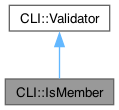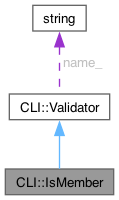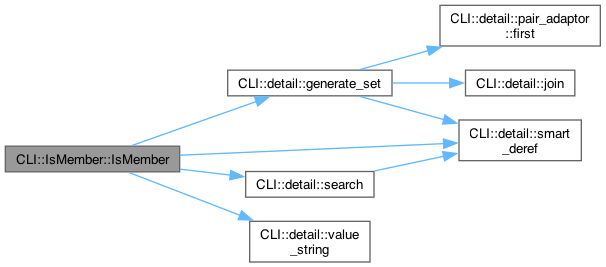Loading...
Searching...
No Matches
CLI::IsMember Class Reference
Verify items are in a set. More...
#include <CLI11.hpp>
Inheritance diagram for CLI::IsMember:

Collaboration diagram for CLI::IsMember:

Public Types | |
| using | filter_fn_t = std::function<std::string(std::string)> |
Public Member Functions | |
| template<typename T , typename... Args> | |
| IsMember (std::initializer_list< T > values, Args &&... args) | |
| This allows in-place construction using an initializer list. | |
| template<typename T > | |
| IsMember (T &&set) | |
| This checks to see if an item is in a set (empty function) | |
| template<typename T , typename F > | |
| IsMember (T set, F filter_function) | |
| template<typename T , typename... Args> | |
| IsMember (T &&set, filter_fn_t filter_fn_1, filter_fn_t filter_fn_2, Args &&... other) | |
| You can pass in as many filter functions as you like, they nest (string only currently) | |
 Public Member Functions inherited from CLI::Validator Public Member Functions inherited from CLI::Validator | |
| Validator ()=default | |
| Validator (std::string validator_desc) | |
| Construct a Validator with just the description string. | |
| Validator (std::function< std::string(std::string &)> op, std::string validator_desc, std::string validator_name="") | |
| Construct Validator from basic information. | |
| Validator & | operation (std::function< std::string(std::string &)> op) |
| Set the Validator operation function. | |
| std::string | operator() (std::string &str) const |
| std::string | operator() (const std::string &str) const |
| Validator & | description (std::string validator_desc) |
| Specify the type string. | |
| Validator | description (std::string validator_desc) const |
| Specify the type string. | |
| std::string | get_description () const |
| Generate type description information for the Validator. | |
| Validator & | name (std::string validator_name) |
| Specify the type string. | |
| Validator | name (std::string validator_name) const |
| Specify the type string. | |
| const std::string & | get_name () const |
| Get the name of the Validator. | |
| Validator & | active (bool active_val=true) |
| Specify whether the Validator is active or not. | |
| Validator | active (bool active_val=true) const |
| Specify whether the Validator is active or not. | |
| Validator & | non_modifying (bool no_modify=true) |
| Specify whether the Validator can be modifying or not. | |
| Validator & | application_index (int app_index) |
| Specify the application index of a validator. | |
| Validator | application_index (int app_index) const |
| Specify the application index of a validator. | |
| int | get_application_index () const |
| Get the current value of the application index. | |
| bool | get_active () const |
| Get a boolean if the validator is active. | |
| bool | get_modifying () const |
| Get a boolean if the validator is allowed to modify the input returns true if it can modify the input. | |
| Validator | operator& (const Validator &other) const |
| Validator | operator| (const Validator &other) const |
| Validator | operator! () const |
| Create a validator that fails when a given validator succeeds. | |
Additional Inherited Members | |
 Protected Attributes inherited from CLI::Validator Protected Attributes inherited from CLI::Validator | |
| std::function< std::string()> | desc_function_ {[]() { return std::string{}; }} |
| This is the description function, if empty the description_ will be used. | |
| std::function< std::string(std::string &)> | func_ {[](std::string &) { return std::string{}; }} |
| std::string | name_ {} |
| The name for search purposes of the Validator. | |
| int | application_index_ = -1 |
| A Validator will only apply to an indexed value (-1 is all elements) | |
| bool | active_ {true} |
| Enable for Validator to allow it to be disabled if need be. | |
| bool | non_modifying_ {false} |
| specify that a validator should not modify the input | |
Detailed Description
Member Typedef Documentation
◆ filter_fn_t
| using CLI::IsMember::filter_fn_t = std::function<std::string(std::string)> |
Constructor & Destructor Documentation
◆ IsMember() [1/4]
template<typename T , typename... Args>
|
inline |
Definition at line 2718 of file CLI11.hpp.
2719 : IsMember(std::vector<T>(values), std::forward<Args>(args)...) {}
IsMember(std::initializer_list< T > values, Args &&... args)
This allows in-place construction using an initializer list.
Definition CLI11.hpp:2718
◆ IsMember() [2/4]
◆ IsMember() [3/4]
template<typename T , typename F >
|
inlineexplicit |
This checks to see if an item is in a set: pointer or copy version. You can pass in a function that will filter both sides of the comparison before computing the comparison.
Definition at line 2726 of file CLI11.hpp.
2726 {
2727
2728 // Get the type of the contained item - requires a container have ::value_type
2729 // if the type does not have first_type and second_type, these are both value_type
2730 using element_t = typename detail::element_type<T>::type; // Removes (smart) pointers if needed
2731 using item_t = typename detail::pair_adaptor<element_t>::first_type; // Is value_type if not a map
2732
2733 using local_item_t = typename IsMemberType<item_t>::type; // This will convert bad types to good ones
2734 // (const char * to std::string)
2735
2736 // Make a local copy of the filter function, using a std::function if not one already
2737 std::function<local_item_t(local_item_t)> filter_fn = filter_function;
2738
2739 // This is the type name for help, it will take the current version of the set contents
2741
2742 // This is the function that validates
2743 // It stores a copy of the set pointer-like, so shared_ptr will stay alive
2745 local_item_t b;
2746 if(!detail::lexical_cast(input, b)) {
2748 }
2749 if(filter_fn) {
2750 b = filter_fn(b);
2751 }
2753 if(res.first) {
2754 // Make sure the version in the input string is identical to the one in the set
2755 if(filter_fn) {
2757 }
2758
2759 // Return empty error string (success)
2760 return std::string{};
2761 }
2762
2763 // If you reach this point, the result was not found
2764 std::string out(" not in ");
2766 return out;
2767 };
2768 }
std::function< std::string()> desc_function_
This is the description function, if empty the description_ will be used.
Definition CLI11.hpp:2092
std::string generate_set(const T &set)
Generate a string representation of a set.
Definition CLI11.hpp:2584
std::string value_string(const T &value)
get a string as a convertible value for arithmetic types
Definition CLI11.hpp:1112
auto search(const T &set, const V &val) -> std::pair< bool, decltype(std::begin(detail::smart_deref(set)))>
A search function.
Definition CLI11.hpp:2628
@ ValidationError
typename std::remove_const< value_type >::type first_type
Definition CLI11.hpp:931
static auto first(Q &&pair_value) -> decltype(std::forward< Q >(pair_value))
Get the first value (really just the underlying value)
Definition CLI11.hpp:935
Here is the call graph for this function:

◆ IsMember() [4/4]
template<typename T , typename... Args>
|
inline |
The documentation for this class was generated from the following file:
- programs/clio/CLI11.hpp